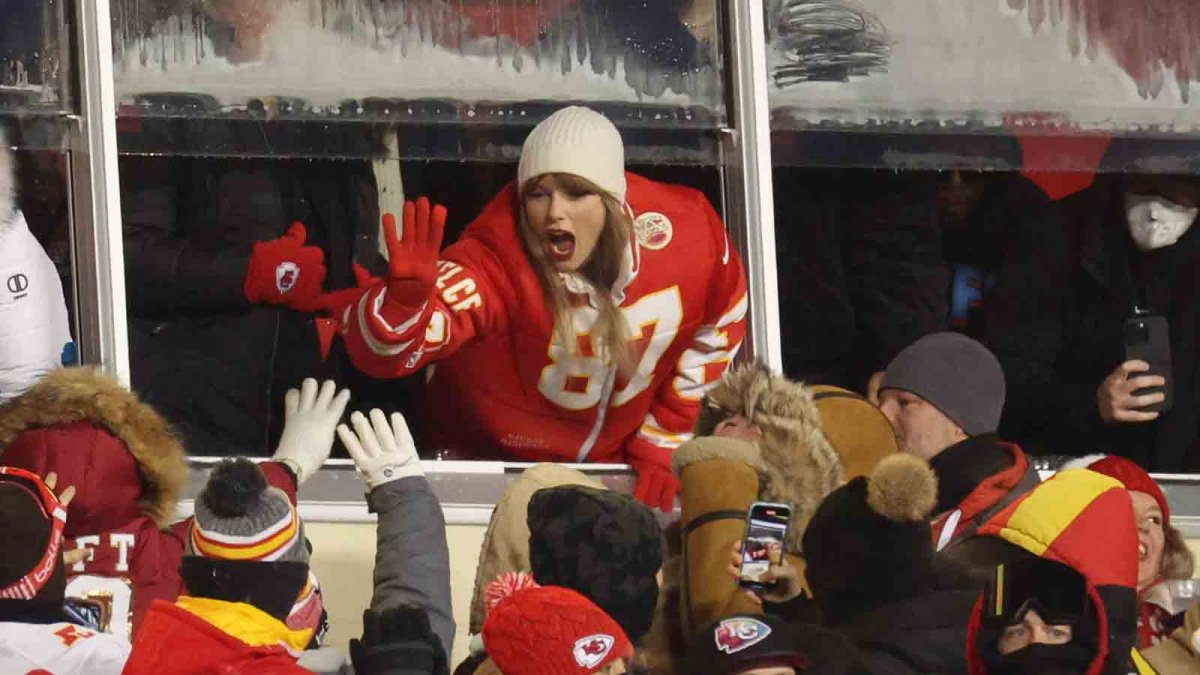Taylor Swift celebrates with fans while sporting Kristen Juszczyk’s custom-made jersey jacket. Photo courtesy of nbcnewyork.com.
REECE BUTLER | OPINION CO-EDITOR | rmbutler@butler.edu
Overtime, or “OT”, is an opinion column series where the Collegian takes national sports headlines or polarizing topics and gives them a Butler-centric angle.
Since the emergence of internationally acclaimed pop star Taylor Swift and footballer Travis Kelce’s recent relationship, the NFL has never been more popular. Specifically, Kelce and his team, the Kansas City Chiefs, have seen a significant increase in social media followers, overall viewership and merchandise sales. Moreover, Swift’s influence has been felt by women surrounding the league, most notably among the wives and girlfriends — familiarly called the WAGs— of current professional athletes.
For instance, Kristen Juszczyk, whose husband, Kyle Juszczyk, plays for the 49ers, just got her clothing business signed with the NFL after Swift — among other big names like Olivia Culpo and Taylor Lautner — sported one of her custom-made jackets.
There seem to be plenty of positives here with numbers of all kinds trending upward for an already nationally-beloved sport, as well as lots of support for the relationship and new opportunities for longtime WAGs. Given that, you might think that NFL fans would be all for this couple. However, given the tone of some responses to Swift’s appearances, I’d wager a bet that it hasn’t been quite that simple.
Charlie Steel, a junior applied business technology major who identifies as a ‘non-Taylor Swift hater’, noted that many NFL fans have been frustrated with Swift’s frequency of appearances. However, his understanding is that the discontentment has little to nothing to do with Swift as a person. Instead, Steel suggests that the overall success of the Chiefs coupled with a new, ultra-famous fan is really what’s causing tension.
“NFL fans … live and die by their teams,” Steel said. “The only thing that makes them more mad [than losing] is seeing the other team and their fans celebrating.”
Given Swift’s address of ‘dads, Brads and Chads,’ she is clearly aware of this pushback. After all, many fans consider her to be the star of the show all of the time — even when the show is professional football.
Junior economics major Lauren Crimmins is a longtime football fan and cites WAGs as a prime reason why.
“They have a lot of influence in the world outside of football and they bring a different audience,” Crimmins said.
Crimmins is also a self-proclaimed Swiftie and a proud owner of a shirt that reads “in my Chiefs era.” For her, the introduction of Taylor Swift to the world of WAGs seemed pretty mind-blowing, given Swift’s prior fame.
“I was like ‘Isn’t [Swift] a little too famous?’” Crimmins said.
While Crimmins sees fans’ skepticism as fairly unique to Swift, there are definitely parallels among the world of WAGs. After all, in a time where a renowned Olympian believes that her husband’s NFL career is more notable than hers, who’s really surprised that people are calling billionaire Swift a gold-digger?
Mackenzie Beal, a senior speech, language and hearing sciences major who notably came to her Collegian interview in a Taylor Swift sweatshirt, has seen the recent backlash to Swift’s appearances at games as a gendered issue.
“A lot of the negative energy is just … ‘Women aren’t in [leading sports] role[s],’” Beal said. “It’s something that people aren’t used to seeing.”
Beal specifically cited an uptick in women’s involvement surrounding the NFL as a sign of changing times and something that could make more traditional fans feel threatened.
It’s also possible that the sheer bulk of responses to Swift’s recent features makes it seem like the NFL is suddenly all about her.
However, Swift’s time on camera isn’t nearly as prolonged as some would have you believe. A recent New York Times article calculated that, on average, she appears for less than 25 seconds per each roughly three-hour game that she attends.
Steel concurred that Swift’s influence has felt overwhelming due to social media responses, not her actual airtime.
“I feel like every Monday after all the games all you see is the clips of her and everyone being like ‘Why are we still doing this?,’” Steel said. “The amount of attention this is getting is … disproportionate to [25 seconds] for sure.”
Moreover, other appearances of supportive friends and family don’t seem to receive even close to the amount of scrutiny and frustration. This includes newsworthy events such as Jason Kelce’s shirtless support of his brother at a recent Chiefs game and Travis Kelce’s own appearance at Swift’s Buenos Aires concert — both of which were met with overwhelming praise.
It’s not that Swift — or any celebrity — is a blameless figure. There are plenty of valid criticisms of the singer’s work and persona, such as her mind-boggling contributions to carbon emissions and how centering feminist narratives on her leads to ignoring intersectionality. Moreover, NFL WAGs and the myriad of fan responses to them have existed before and will continue to exist after Swift.
But the narrative that she is negating the work of the Chiefs or ruining football seems, at best, misguided and, at worst, intentionally inflammatory, misogynistic and ignorant.
After all, as Crimmins pointed out, perhaps some newfound viewership started out of an interest in Swift’s comings and goings, but it may have evolved into a genuine appreciation for the sport.
“People might be tuning in for Taylor but leaving with the team,” Crimmins said.



